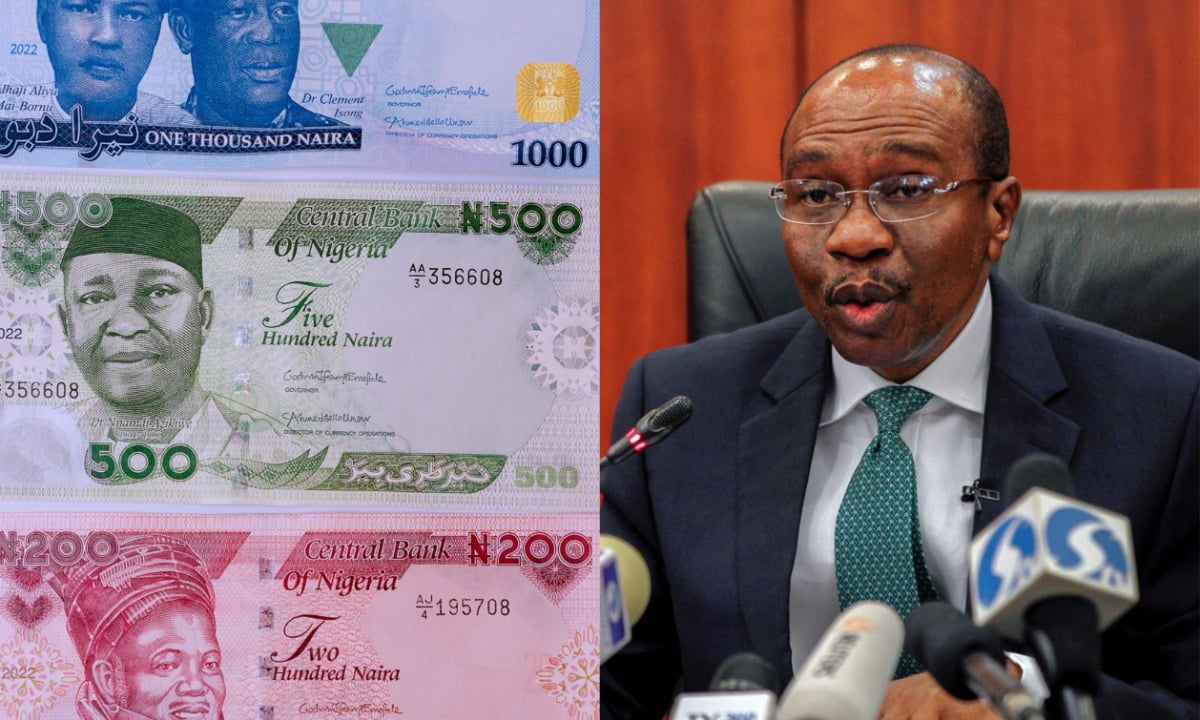Latest CBN News update on Naira Notes amid Naira Scarcity today March 24, 2023, can be accessed below.
Following the Naira Scarcity in Nigeria, Newsone has compiled the latest news on new Naira notes. This means the latest updates on the Naira crisis in Nigeria can be accessed on this page.
Below are the latest CBN news update on new Naira Notes amid Naira scarcity today
Naira crisis: CBN releases old notes to commercial banks
The Central Bank of Nigeria, CBN, is set to release all N1,000, N500 and N200 notes in its custody to Deposit Money Banks.
A source at the CBN disclosed this to on Wednesday.
According to him, the apex bank has concluded plans to disburse old notes to Deposit Money Banks across the country starting from Thursday (today).
He added that the development would end the two-month-long Naira scarcity in Nigeria.
This comes on the heels of the Nigeria Labour Congress, NLC, planned nationwide strike and protests in CBN offices following the hardship created by the bank’s naira redesign policy.
The CBN’s latest decision came several weeks after the Supreme Court ordered that old N1,000, N500 and N200 notes should remain legal tender until December 31, 2023.
Economic expert, a lecturer at Lead City University, Ibadan, Prof Godwin Oyedokun, has said that the CBN is willing to release cash to commercial banks after the general elections.
He explained that since the polls were over, the CBN would begin the disbursement of the new and old notes.
NLC Declares Nationwide Strike Over Naira Scarcity
NLC has declared a Nationwide Strike over Naira Scarcity in Nigeria. Newsone reports that the President of the Nigeria Labour Congress (NLC), Joe Ajaero has directed public sector workers in the country to embark on strike beginning from Wednesday next week, March 29, 2023.
This online news platform understands that Ajaero also directed that affiliate unions constituting the Nigeria Labour Congress should also be on standby for picketing exercises across all branches of the Central Bank of Nigeria, CBN, nationwide.
The directive followed an earlier ultimatum issued by the Central Working Committee members of the NLC last week criticising the cash swap policy of the Federal Government.
The NLC President said the decision to picket CBN branches became necessary, as the Federal Government and the CBN have not shown any commitment to address the situation.
Newsone Nigeria reports that Ajaero lamented that despite the Supreme Court order allowing the old N500 and N1000 notes to circulate with the new notes till December 31 this year, the situation appears to be getting worse as workers cannot access cash to pay fares to work, nor can they buy food for their families.
CBN limits circulation of new notes as banks disobey Supreme Court order
Some normalcy has returned despite persistent queues in some banks and ATMs across Nigeria.
Bank officials say the Central Bank of Nigeria (CBN) supplied more old naira notes than the newly redesigned N200, N500, and N1,000 notes.
CBN supply more old notes
The development follows the ruling of the Supreme Court on March 3, 2023, which extended the validity of the old naira notes till December 31, 2023.
According to reports, banks began simultaneous dispensing of the old naira notes over the counters and via ATMs a few days after CBN issued the directive.
Traders, Transporters, petrol stations, and others have begun accepting the old naira notes after initial skepticism.
Banks say they need more new naira notes as both ATMs and bank tellers dispense more of the old naira notes.
Bank officials say they have not had new supplies of the new naira notes since CBN reintroduced them into circulation.
A banker with one of the new-generation banks said that CBN had paused the circulation of old naira notes and only resumed issuing old notes as directed by the Supreme Court.
“We have not received any new naira notes in the past one. CBN is reissuing only old ones,” she said.
Naira scarcity reduced vote-buying, says Buhari
The President, Major General Muhammadu Buhari (retd.), on Saturday said the scarcity of naira notes reduced the incidence of vote-buying. The President, after voting in Daura, Katsina State, urged Nigerians to collect money offered to them by vote-buyers but vote their conscience.
The naira scarcity had led to crisis nationwide, in which case many Nigerians lamented their inability to buy necessities or move around. The Central Bank of Nigeria had come under heavy criticism for the policy, which many described as ill-timed and poorly implemented.
Buhari told journalists after voting at Ward A, Sarkin Yara Polling Unit, 003, in Katsina, “I am aware that the money is not there like before for people to sway voters, like they used to do. And if they bring out money, the people should pocket it and still vote their conscience.”
The Senior Special Assistant to the President on Media and Publicity, Garba Shehu, disclosed this in a statement on Saturday. The statement was titled ‘Nigerians know we mean what we say, they will vote for us again, says President Buhari.’
The President was quoted as saying his regime had “diminished” the practice of vote-buying. He boasted that the All Progressives Congress would emerge victorious in the governorship and state Assembly elections nationwide.
New naira pains persist despite fresh CBN orders
Barely three days after the Central Bank of Nigeria declared old N1,000, N500 and N200 notes as legal tender, Deposit Money Banks say they are beginning to run out of the old currencies.
The development led to severe hardship and pain for several bank customers seeking to withdraw funds on Wednesday. The CBN had on Monday directed banks to pay out and accept the old notes from their customers.
This came after President Muhammadu Buhari, said he did not stop the CBN and the Attorney General of the Federation Office from complying with the Supreme Court judgment ordering that old naira notes should remain legal tender till December 31, 2023.
However, commercial banks which began the disbursements of old N1,000, N500, and N200 notes to their customers on Tuesday revealed on Wednesday that it had started running out of the old currencies.
This made several bank customers become stranded in banking halls as well as in major cities and towns.
While some bank officials said their stocks of old notes were beginning to run low, others said they had exhausted the old currencies in their vaults.
Finally, CBN Issues Official Statement On the Acceptance of Old Naira Notes
The Central Bank of Nigeria (CBN) led by Godwin Emefiele says the old N200, N500, and N1000 notes remain legal tender until December 31, 2023.
This online news platform understands that the CBN official statement on the acceptance of Old Naira Notes was announced by the CBN spokesperson, Isa Abdulmumin on Monday evening, March 13, 2023.
“In compliance with the established tradition of obedience to court orders and sustenance of the Rule of Law Principle that characterized the government of President Muhammadu Buhari, and by extension, the operations of the Central Bank of Nigeria (CBN), as a regulator, Deposit Money Banks operating in Nigeria have been directed to comply with the Supreme Court ruling of March 3, 2023,” the statement reads.
“Accordingly, the CBN met with the Bankers’ Committee and has directed that the old N200, N500 and N1000 banknotes remain legal tender alongside the redesigned banknotes till December 31, 2023.
“Consequently, all concerned are directed to conform accordingly,” the statement on the acceptance of Old Naira Notes added.
Finally, CBN Directs Nigerian Banks To Accept Old Naira Notes
CBN has finally directed Nigerian Banks to accept Old Naira Notes.
Newsone reports that the governor of Anambra State, southeast Nigeria, and former CBN Governor, Prof Charles Soludo, on Monday, March 13, 2023, confirmed that the Central Bank of Nigeria has asked commercial banks to dispense and accept old naira notes as deposits.
This online news platform understands that Professor Soludo, a former CBN governor, made this known in a statement he posted on his social media handles on Monday, March 13, 2023.
Newsone Nigeria reports that the Anambra Governor explained that the Governor of CBN, Godwin Emefiele gave the directive at a Banker’s Committee meeting on Sunday, March 12, 2023.
Governor Soludo, who revealed that CBN Governor Emefiele personally confirmed the directive to him, called on Anambra residents to report Nigerian banks refusing to accept the old notes.
Nigerian Governor Orders Arrest of People Rejecting Old Naira Notes in His State
CBN Takes Decision On Old Naira Notes After Supreme Court Judgment
In compliance with the March 3 Supreme Court judgment, which extended the validity of the Central Bank of Nigeria, CBN, currency redesign policy to December 31, some banks across the country have started paying out the old N500 and N1,000 notes to their customers.
Findings, however, revealed partial compliance as some banks have not followed suit, maintaining that they are awaiting official directive from CBN to do so.
Naira redesign: Buhari’s order to CBN will do magic – Etiaba
Supreme Court Suspends Expiration of Old Naira Notes
The Nigerian Election And Naira Crisis Are Fueling Bitcoin Adoption
The recent economic cash crisis in Nigeria, caused by the naira redesign, political climate, and economic conditions, has increased bitcoin’s value proposition for average Nigerians. In Africa, bitcoin offers an indispensable financial safe haven.
The naira redesign is only the most recent catalyst magnifying the challenges faced by average Nigerians, a benevolent move to curb economic challenges and counterfeiting notes has resulted in a doubling down on the financial pressures faced by Nigerians.
Nigerians are currently facing record-high inflation at ~21%, a cash shortage of the newly redesigned naira notes, and an incoming administration that will determine the country’s course for the next few decades and the continent’s political landscape.
All eyes were on our country as citizens voiced their frustrations at the ballot on Saturday, and our Government continues to wrestle with its growing economic challenges.
That’s the latest CBN news update on New Naira Notes today, kindly check back tomorrow for more. Read Naija News on Newsone Nigeria.







